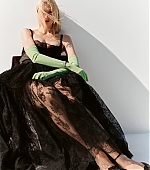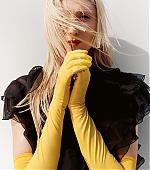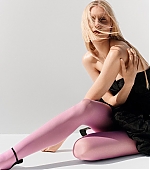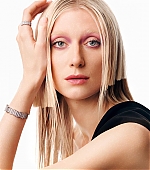



Forget the TV show, it’s going to make for quite the series finale to the British autumn. Only months into our post-Elizabethan world, Netflix’s megahit The Crown is returning for a fifth series of the addictive, splashy, soapy royal masquerade, with a final recast of the main players and more wigs than a Cher comeback tour.
It is similarly febrile, too. On a wet and fateful day in October, somewhere in the no man’s land between Liz and Rishi, the full series trailer dropped. Then jaws did. In Buckingham Palace and beyond, questions were barked: will our newly elevated King be dragged over the coals? Will the late Queen’s memory be left intact? Is now really the time to trawl over the phone-tapped sexy talk of a new Queen Consort? In short: popcorn at the ready.
Much of the attention has alighted on the person who, at the tail end of summer, I rushed through Highbury Fields, in North London, to meet. Elizabeth Debicki, an Australian 32-year-old with formidable talent and a steel trap mind, is a screen and stage actor of rare repute, and the latest brave soul to touch the live wire of playing Princess Diana. And in the 1990s no less – the era of Andrew Morton, superyachts, Panorama and pain. The decade she would define and that would destroy her.
In some ways, Debicki – who is as unflashy as she is intellectual – is an unusual fit for the part. Though, granted, not physically. She arrives at our sunny table outside a hyper-healthy local café selling delicious bowls that she likes, with her hair blonded, head to toe in linen with Dior sandals and a sprinkle of late summer jewellery. She was cast formally for The Crown’s series five and six two years ago, though it had been coming down the pipeline for a while. Initially, she tried out for a minor part in the show’s first season but says the producers immediately cried out “Di!” when she walked through the door. She says she “can’t see” a huge physical likeness – she runs a finger over her nose in profile, showing me the difference. But once the wig and kohl eyeliner went on, the effect was eerie and everyone agreed she simply had to play her.
Naturally, she was a little spooked at the prospect. “I think in the very beginning that did overwhelm me, the idea of this kind of collective [of Diana disciples] out there,” she says. “It’s a trap, right? A swampy quagmire. So, I would stand over the kitchen sink and say, ‘I cannot do this.’” But slowly she shed her own light Aussie tones and got into the accent – “Al’right” – to the point her sister and friends started picking it up too, and then the scripts arrived and she realised: “This isn’t meta. These are characters.”
“It’s a part,” she continues. Will viewers make the distinction? Each series of the show has been met with its share of pearl-clutching by some dustier MPs and the cake-and-eat-it tabloids, distraughtly imagining a viewership who are unable to separate fact from fiction. (A not entirely unreasonable conceit, to be fair; isn’t the show’s stock-in-trade making you sort of believe everything it’s telling you, like an especially juicy Vanity Fair piece?) But things have been flat out frantic this time around. Judi Dench even wrote a piece for The Times slamming the makers of it. [More at Source]